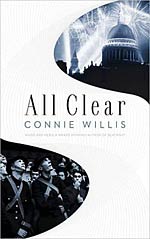
![]() verkisto
verkisto
7/26/2016
![]()
Despite my being in the middle of another unique and interesting book, I had to set it aside to come back to it when All Clear finally hit the market. I mean, not only is it the latest Connie Willis book, but it's also the second half of the story told in Blackout, released earlier this year. Note that I didn't write "sequel"; that's because this book isn't one. The story of Blackout and All Clear are one massive, 1100+ page novel, broken into two volumes due to publishing constraints. As such, this isn't a complete story, any more than Blackout was. And since Blackout ended on such a cliffhanger ending, it was pretty necessary for me to start reading it right away.
Anyone familiar with Connie Willis will know that she enjoys the idea of time-traveling historians, and with England during World War II. With these two stories, Willis puts them both together, with great effect. She follows a handful of characters who have been sent back in time to observe events during the Blitz, and then proceeds to put them into a comedy of errors where they struggle to find their way back to their own present. This isn't anything new, really, but Willis manages to bring a new twist to this idea, and manages to do so with great success. In fact, what she manages to do with the entire story makes you wonder how long she's been planning this grand conclusion, since it doesn't just tie together the loose ends in this story, but also manages to bring all of her Oxford historian time-travel novels together into a single thread. It's brilliant, really, and came as a real surprise to me.
As usual, the author brings a lot of her trademark symbolism and imagery to the book, but this time, there is a lot less comedy in her story. This time around, the struggle of finding their way back to their present becomes more of a nightmare, where they find themselves blocked at every turn. In a way, this kept the story going, but at the same time, it became almost frustrating in how repetitive it was. There were times when I thought that if I had to read one more character trying to remain brave in the face of her friends, that I was going to lose it. Amazingly, Willis pulled even this off, to the point where I can't complain too much about it now.
My biggest complaint, I suppose, is the novel's length. There was a lot of detail, and a lot of back-and-forth with the characters going all over England trying to find a way home, but it all turned out to be very necessary, because of the main point of the novel: One act may not have been enough to alter the course of the war, but all of the infinitesimally small acts of a number of people during the war could have a cumulative effect on how it progressed. In a way, this point is obvious in the way that Willis tells the story, but it's easy to overlook this as the theme of the novel, as she gives praise to all the people in England who supported their country and sacrificed much to help their country endure. It's almost an antiquated notion, but it's hard to leave the story without thinking that everyone who lived in England during World War II was a hero. And I think that's what makes the novel so important.
It would have been easy to give up on the novel because of its length (and I'll admit I was almost tempted), but I'm glad I persevered. I'm not sure that this will ever take on the status of either Bellwether or Doomsday Book, but honestly, it should. Together, the novels make up a grand story that's well worth the effort to read.